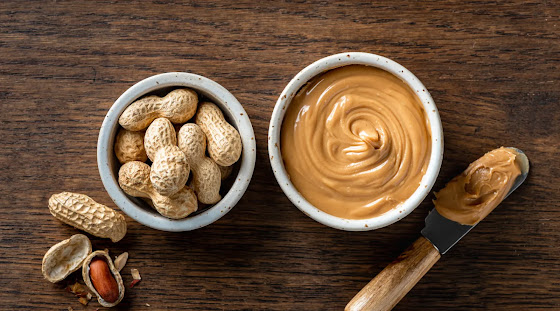How Peanut Butter Supports heart Health for long and healthy life
In a world where heart health takes center stage, there's one pantry staple that stands out as a heart-healthy hero – peanut butter. Beyond its delectable taste and creamy texture, peanut butter packs a powerful punch of nutrients that can significantly contribute to a robust cardiovascular system. This article dives into the heart of the matter, exploring the various ways peanut butter supports heart health for a life filled with vitality.
- Rich in Monounsaturated Fats:
One of the key components that make peanut butter a heart-healthy choice is its high content of monounsaturated fats. These fats are known to promote good cholesterol levels (HDL) while reducing bad cholesterol (LDL), creating a favorable balance for heart health.- Powerful Antioxidants:
Peanut butter is a rich source of antioxidants, including resveratrol, which has been linked to cardiovascular benefits. These antioxidants help combat oxidative stress, reducing inflammation and protecting the delicate lining of blood vessels.- A Symphony of Nutrients:
Beyond healthy fats, peanut butter is a nutrient powerhouse. It provides an array of essential nutrients such as potassium, magnesium, and vitamin E, each playing a crucial role in maintaining optimal heart function and blood pressure regulation.- Fiber for Heart Happiness:
The fiber content in peanut butter contributes to heart health by promoting a feeling of fullness, aiding in weight management, and helping to control blood sugar levels. Maintaining a healthy weight and blood sugar are key factors in preventing heart disease.- Blood Pressure Benevolence:
The potassium found in peanut butter plays a vital role in regulating blood pressure. Consuming potassium-rich foods, like peanut butter, may help relax blood vessels and reduce the strain on the cardiovascular system.- Cholesterol Control Mechanisms:
The phytosterols in peanut butter have been associated with lowering cholesterol levels. These plant compounds compete with cholesterol for absorption in the digestive tract, helping to keep cholesterol levels in check.- Peanut Butter and Heart-Healthy Diets:
Integrating peanut butter into heart-healthy dietary patterns, such as the Mediterranean or DASH diet, can enhance the overall cardiovascular benefits. The combination of nuts and legumes in these diets aligns seamlessly with the nutritional profile of peanut butter.- Balancing Act:
While peanut butter offers numerous cardiovascular advantages, moderation is key. Opting for natural peanut butter without added sugars or hydrogenated oils ensures you reap the full benefits without compromising your heart health goals.- Incorporating Peanut Butter into Your Heart-Healthy Lifestyle:
Practical tips on incorporating peanut butter into daily meals, from adding it to smoothies and oatmeal to using it as a savory ingredient in sauces and dressings, making heart-healthy eating enjoyable and sustainable.- The Future of Heart Health:
Looking ahead, ongoing research explores the potential of peanut butter and its components in preventing cardiovascular diseases. Stay informed about the latest findings and advancements in the quest for a heart-healthy life.Peanut butter offers several nutritional components that contribute to good heart health
- Healthy Fats:
- Monounsaturated Fats: Peanut butter is rich in monounsaturated fats, which can help improve cholesterol levels by increasing high-density lipoprotein (HDL or "good" cholesterol) and decreasing low-density lipoprotein (LDL or "bad" cholesterol).
- Antioxidants:
- Resveratrol: Found in peanuts, resveratrol is an antioxidant that has been linked to cardiovascular benefits. It helps reduce oxidative stress, inflammation, and protects the lining of blood vessels.
- Vitamins and Minerals:
- Vitamin E: Peanut butter is a good source of vitamin E, an antioxidant that helps protect cells, including those in the cardiovascular system.
- Magnesium: Contributes to muscle and nerve function, including the heart muscle.
- Potassium: this is help you to regulate blood pressure by balancing the effects of sodium.
- Protein:
- Peanut butter is a protein-rich food. Protein is essential for overall health, and it can help with weight management by promoting a feeling of fullness.
- Fiber:
- Dietary fiber in peanut butter supports heart health by helping to lower cholesterol levels. It also aids in digestion and promotes a healthy gut, which can indirectly contribute to heart health.
- Arginine:
- Peanuts contain arginine, an amino acid that can help improve blood flow by promoting the production of nitric oxide, which helps dilate blood vessels.
- Phytosterols:
- These plant compounds in peanut butter have been associated with lowering cholesterol levels. They compete with cholesterol for absorption in the digestive tract, helping to maintain a healthy cholesterol profile.
- Low in Saturated Fat:
- While peanut butter is calorie-dense, it is relatively low in saturated fat. Limiting your saturated fat intake is important for your good heart health.
- Omega-6 Fatty Acids:
- Peanuts contain omega-6 fatty acids, which, in moderation, are part of a healthy diet. These fatty acids play a role in heart health and inflammation control.
- Weight Management:
- Including peanut butter in a balanced diet can contribute to weight management. Maintaining a healthy weight is crucial for overall heart health.








![5 Amazing Foods for Weight Loss in Just 2 Weeks [100% Real ]](https://blogger.googleusercontent.com/img/b/R29vZ2xl/AVvXsEg6epRh-XpwGMz1pI0tMtU2znZ-lT_5fQscZvn5DYsqw30CgyJmSjQrrxEeNLGtvuKDwZtn-9c2IKhpkeKEZuWwvqwkVMWSd31nCmBGqMP8bRFP2qARmr5DRlG88FGEhNqheiRUSKYKApa1qISIQCudAUxRPi8V1o3UTMWrqq39-Q83afWa97-PSEhqDMRL/w680/scale.webp)


